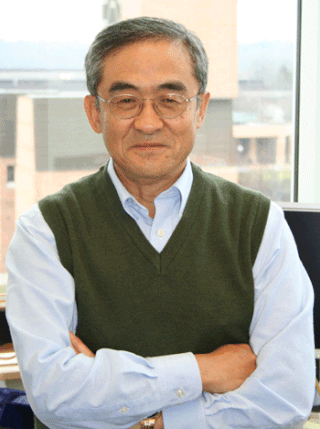Theoretical computer science is a subfield of computer science and mathematics that focuses on the abstract and mathematical foundations of computation, such as the theory of computation, formal language theory, the lambda calculus and type theory.
Wireless sensor networks (WSNs) refer to networks of spatially dispersed and dedicated sensors that monitor and record the physical conditions of the environment and forward the collected data to a central location. WSNs can measure environmental conditions such as temperature, sound, pollution levels, humidity and wind.
In telecommunications, an interference is that which modifies a signal in a disruptive manner, as it travels along a communication channel between its source and receiver. The term is often used to refer to the addition of unwanted signals to a useful signal. Common examples include:
In computer networking, linear network coding is a program in which intermediate nodes transmit data from source nodes to sink nodes by means of linear combinations.
Babak Hassibi is an Iranian-American electrical engineer, computer scientist, and applied mathematician who is the inaugural Mose and Lillian S. Bohn Professor of Electrical Engineering and Computing and Mathematical Sciences at the California Institute of Technology (Caltech). From 2011 to 2016 he was the Gordon M Binder/Amgen Professor of Electrical Engineering. During 2008-2015 he was the Executive Officer of Electrical Engineering and Associate Director of Information Science and Technology.
Virgil Dorin Gligor is a Romanian-American professor of electrical and computer engineering who specializes in the research of network security and applied cryptography.

Kang Geun Shin is a South Korean-born computer scientist and the Kevin and Nancy O'Connor Professor of Computer Science in the Electrical Engineering and Computer Science Department at the University of Michigan. He is also the founding director of the Real-Time Computing Laboratory (RTCL). He is known for his contributions to the field of real-time fault-tolerant systems. Shin is a recipient of the Korean Ho-Am Prize in Engineering. This prize is awarded for the "outstanding contributions to the development of science and culture and enhancement of the welfare of mankind".
In mathematics and telecommunications, stochastic geometry models of wireless networks refer to mathematical models based on stochastic geometry that are designed to represent aspects of wireless networks. The related research consists of analyzing these models with the aim of better understanding wireless communication networks in order to predict and control various network performance metrics. The models require using techniques from stochastic geometry and related fields including point processes, spatial statistics, geometric probability, percolation theory, as well as methods from more general mathematical disciplines such as geometry, probability theory, stochastic processes, queueing theory, information theory, and Fourier analysis.
Ramesh R. Rao is currently the director of the California Institute for Telecommunications and Information Technology, a division of the University of California, San Diego. He was appointed as the first holder of the Qualcomm Endowed Chair in Telecommunications and Information Technologies in 2004 in the department of Electrical and Computer Engineering of the Jacobs School of Engineering at University of California, San Diego where he has been a faculty member since 1984.
Yunhao Liu is a Chinese computer scientist. He is the Dean of Global Innovation Exchange (GIX) at Tsinghua University.
Syed Ali Jafar is an Indian-American electrical engineer and computer scientist. He works at the University of California, Irvine, and has previously worked at Lucent Bell Labs, Qualcomm and Hughes Software Systems. His research interests include multi-user information theory, wireless communications and network coding. He was named Fellow of the Institute of Electrical and Electronics Engineers (IEEE) in 2014 "for contributions to analyzing the capacity of wireless communication networks" and won the Blavatnik Award for Young Scientists in 2015 "for his discoveries in interference alignment in wireless networks, changing the field’s thinking about how these networks should be designed."
Timothy M. Pinkston is an American computer engineer, researcher, educator and administrator whose work is focused in the area of computer architecture. He holds the George Pfleger Chair in Electrical and Computer Engineering and is a Professor of Electrical and Computer Engineering at University of Southern California (USC). He also serves in an administrative role as Vice Dean for Faculty Affairs at the USC Viterbi School of Engineering.

Zygmunt J. Haas is a professor and distinguished chair in computer science, University of Texas at Dallas (UTD) also the professor emeritus in electrical and computer engineering, Cornell University. His research interests include ad hoc networks, wireless networks, sensor networks, and zone routing protocols.
Arun K. Somani is Associate Dean for Research of College of Engineering, Distinguished Professor of Electrical and Computer Engineering and Philip and Virginia Sproul Professor at Iowa State University. Somani is Elected Fellow of Institute of Electrical and Electronics Engineers (IEEE) for “contributions to theory and applications of computer networks” from 1999 to 2017 and Life Fellow of IEEE since 2018. He is Distinguished Engineer of Association for Computing Machinery(ACM) and Elected Fellow of The American Association for the Advancement of Science(AAAS).
Giuseppe Caire is an Italian telecommunications engineer.
Can Emre Koksal is an electrical engineer, computer scientist, academic, and entrepreneur. He is the Founder and CEO of Datanchor, and a professor of Electrical and Computer Engineering at Ohio State University.


